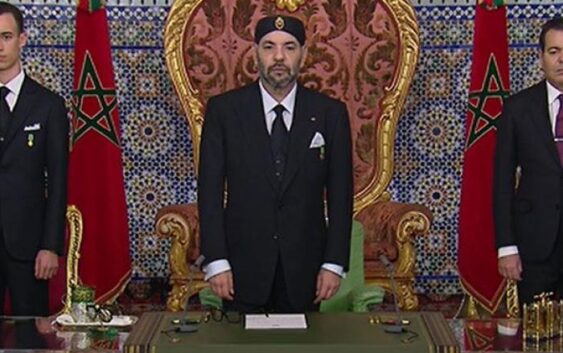- HOW TEMANE-MAPUTO ELECTRICITY TRANSMISSION LINE PROJECT IS GOING THROUGH TEST IN MOZAMBIQUE
- NEWLY OPENED PLASTIC RECYCLING PLANT SET TO HELP COMBAT NAMIBIA's PLASTIC INDUSTRY
- PROGRESS MADE ON PIIM PROJECTS AS OVER 85% COMPLETED IN ANGOLA
- WORLD BANK KICK-OFF INSPECTION OF USMID PROGRAM IN UGANDA
- ALGERIA MINISTER RECIEVED HARBOR ENERGY CEO OVER ENERGY PARTNERSHIP
MOROCCO KING CELEBRATE NIGERIA-MOROCCO GAS PIPELINE PROJECT

The gas pipeline aims to ensure energy independence on the continent amid a context marked by serious challenges due to regional crises.
King Mohammed VI celebrated the Nigeria-Morocco gas pipeline project, emphasizing its goal in a bid to support accelerating socioeconomic development on the continent.
The King expressed satisfaction with the gas project during his speech, commemorating the 47th anniversary of the Green March on Sunday.
While the Green march helped the country to regain its territorial integrity and sovereignty over its southern provinces, the country continued to be determined to initiate economic-driven campaigns to foster development in the region, benefiting not only Morocco but the whole continent.
The monarch emphasized that Morocco’s southern provinces have served as a link between Morocco and its African roots at the “human, spiritual, cultural, and economic levels,” stressing that the Moroccan approach is in line with special relations that Morocco enjoys with other African countries.
As part of the country’s determination to consolidate these ties, Morocco worked along with Nigeria on a gas pipeline project, which is more than “just a bilateral project between two sister nations,” the King said.
“I want this to be a strategic project that benefits all of West Africa – a region which is home to more than 440 million people,” the King said, stressing that the project provides opportunities, particularly in terms of energy security.
“This is a project for peace for African economic integration and co-development: a project for the present and the future generations,” King Mohammed VI said,
The 5,600-kilometer-long pipeline project will span over 13 countries along the Atlantic coast, with the ambition of benefiting over 340 million inhabitants.
The pipeline, of which Morocco will be home to 1,672 kilometers, will connect the Nigerian gas to Europe through Morocco, Mauritania, Senegal, Gambia, Guinea Bissau, Guinea, Sierra Leone, Liberia, Ivory Coast, Ghana, Togo, and Benin.
Investors contributing to the project are set to put in a budget of $25 billion to carry out the gas pipeline.
The much-anticipated project was first initiated by King Mohammed VI and Nigerian President Muhammadu Buhari in 2016.
The project aims to promote regional integration in the west African region and reinforce African energy security.
King Mohammed VI set the ambition to see the project as a major “flagship project,” linking Africa to Europe, extending his appreciation to all regional and international institutions which expressed their wish to participate in its implementation.
The King also expressed Morocco’s determination to work with Nigeria and other stakeholders closely and responsibility to implement the project “as soon as possible.”
Morocco and Nigeria hold frequent talks to exchange views and talks about the pipeline project.
The latest meeting took place today when Moroccan ambassador to the UK Hakim Hajoui met with Nigerian President Muhammadu Buhari and High Commissioner to the UK Sarafa Tunji.
During the meeting, the Moroccan diplomat delivered a message from King Mohammed VI. The meeting comes as part of the two countries determination to place more priority and importance on economic cooperation.
Continuing marches
In addition to the gas pipeline, King Mohammed VI emphasized Morocco’s satisfaction with the growing support for its position and territorial integrity.
The monarch, however, emphasized the importance of remaining mobilized to defend the country’s unity.
“To continue to be faithful to the spirit of the Green March and its everlasting oath, we need to remain mobilized and vigilant to defend our nation’s unity, achieve greater progress and strengthen Morocco’s bonds with its African roots,” he said.
Morocco’s position has been witnessing growing support from the international community- with many countries describing the Moroccan Autonomy Plan as a credible and serious basis to end the dispute over Western Sahara.
Over 90 UN member states expressed support for the autonomy initiative as the only solution to the regional dispute.
The plan suggests making the Sahara region a semi-autonomous territory under Morocco’s sovereignty, allowing the region’s inhabitants to manage their social, economic, and political affairs while Morocco handles defense and diplomacy.
As part of the massive international support, over 27 countries have opened consulates general in the southern provinces of Dakhla and Laayoune, reflecting their support for and recognition of Morocco’s territorial integrity and sovereignty over Western Sahara.
In his speech on the anniversary of the Revolution of King and People in August, King Mohammed VI renewed satisfaction with the opening of international representations in the region and thanked countries for their support for Morocco’s territorial integrity.
The total openings include nearly 40% of African countries.
“I should like to say how much I value the position adopted by our brothers in Africa; approximately 40% of African countries from five regional groups have opened consulates in Laayoune and Dakhla,” the King said in his speech.
In Europe, more than 10 countries have publicly expressed support for Morocco’s Autonomy Plan, including Belgium, the Netherlands, Germany, and Spain.
SOURCE: MoroccoWorldNews

